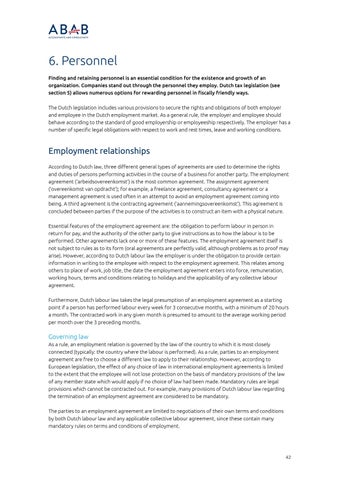6. Personnel Finding and retaining personnel is an essential condition for the existence and growth of an organization. Companies stand out through the personnel they employ. Dutch tax legislation (see section 5) allows numerous options for rewarding personnel in fiscally friendly ways. The Dutch legislation includes various provisions to secure the rights and obligations of both employer and employee in the Dutch employment market. As a general rule, the employer and employee should behave according to the standard of good employership or employeeship respectively. The employer has a number of specific legal obligations with respect to work and rest times, leave and working conditions.
Employment relationships According to Dutch law, three different general types of agreements are used to determine the rights and duties of persons performing activities in the course of a business for another party. The employment agreement (‘arbeidsovereenkomst’) is the most common agreement. The assignment agreement (‘overeenkomst van opdracht’); for example, a freelance agreement, consultancy agreement or a management agreement is used often in an attempt to avoid an employment agreement coming into being. A third agreement is the contracting agreement (‘aannemingsovereenkomst’). This agreement is concluded between parties if the purpose of the activities is to construct an item with a physical nature. Essential features of the employment agreement are: the obligation to perform labour in person in return for pay, and the authority of the other party to give instructions as to how the labour is to be performed. Other agreements lack one or more of these features. The employment agreement itself is not subject to rules as to its form (oral agreements are perfectly valid, although problems as to proof may arise). However, according to Dutch labour law the employer is under the obligation to provide certain information in writing to the employee with respect to the employment agreement. This relates among others to place of work, job title, the date the employment agreement enters into force, remuneration, working hours, terms and conditions relating to holidays and the applicability of any collective labour agreement. Furthermore, Dutch labour law takes the legal presumption of an employment agreement as a starting point if a person has performed labour every week for 3 consecutive months, with a minimum of 20 hours a month. The contracted work in any given month is presumed to amount to the average working period per month over the 3 preceding months.
Governing law As a rule, an employment relation is governed by the law of the country to which it is most closely connected (typically: the country where the labour is performed). As a rule, parties to an employment agreement are free to choose a different law to apply to their relationship. However, according to European legislation, the effect of any choice of law in international employment agreements is limited to the extent that the employee will not lose protection on the basis of mandatory provisions of the law of any member state which would apply if no choice of law had been made. Mandatory rules are legal provisions which cannot be contracted out. For example, many provisions of Dutch labour law regarding the termination of an employment agreement are considered to be mandatory. The parties to an employment agreement are limited to negotiations of their own terms and conditions by both Dutch labour law and any applicable collective labour agreement, since these contain many mandatory rules on terms and conditions of employment.
42



